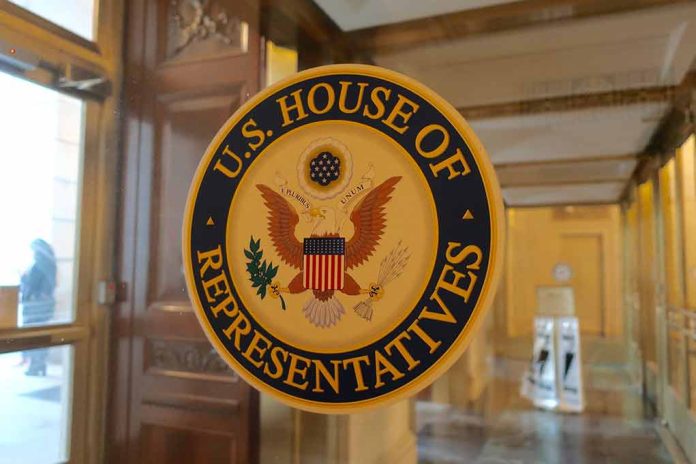
Congress narrowly averts government shutdown, but Trump’s election security measure gets left behind.
At a Glance
- House passes temporary funding bill, extending government operations until December 20
- Trump-backed SAVE Act, an election security measure, excluded from the bill
- Bill passes with bipartisan support, despite opposition from some Republicans
- Debate ignites over GOP priorities and approach to election integrity
Congress Passes Stopgap Funding Bill
In a move that narrowly averted a government shutdown, Congress passed a temporary funding bill to keep federal operations running until December 20. The bill, which received bipartisan support, notably omitted the SAVE Act, an election security measure strongly advocated by former President Donald Trump. This decision has sparked intense debate within the Republican Party about priorities and strategies for ensuring election integrity.
The legislation passed with overwhelming majorities in both chambers, with the Senate voting 78-18 and the House 341-82. All opposition came from Republican members, highlighting internal party divisions over the bill’s contents and the broader approach to government funding and election security.
SAVE Act Exclusion Sparks Controversy
The exclusion of the SAVE Act from the final bill has become a focal point of controversy. This measure, which would have required proof of citizenship for voter registration and mandated states to remove non-citizens from voter rolls, was strongly supported by Trump and many conservative Republicans. House Speaker Mike Johnson’s decision to remove the act from the bill after its initial rejection has led to accusations of defying Trump’s wishes.
“I’m not defying President Trump. I’ve spoken with him at great length, and he is very frustrated about the situation. His concern is election security, and it is mine, as well. It is all of ours,” Johnson told reporters.
Johnson defended his decision, arguing that a GOP-led shutdown just before Election Day would be “political malpractice.” He shifted blame to Senate Majority Leader Chuck Schumer for not advancing the SAVE Act, emphasizing that both he and Trump prioritize election security.
Republican Reactions and Future Implications
The bill’s passage without the SAVE Act has elicited mixed reactions from Republicans. Some, like Rep. Dan Bishop, opposed the bill, calling it “kicking the can down the road.” Others, including House Appropriations Chairman Tom Cole, supported the decision, suggesting that a government shutdown would not have been beneficial to Trump or efforts to maintain Republican control of the House.
“There are two urgent priorities facing Congress right now: funding the government and securing the election. That’s why I was proud to vote last week for a bill that helped accomplish both goals. Unfortunately, it was defeated when nearly all House Democrats opposed a provision requiring a proof of citizenship to register to vote. How you could oppose ensuring the integrity of what may be the closest presidential race in modern history is beyond me.
That’s why I voted against the bill when it was brought back to the House floor with the election protections stripped away. We’re facing what may be the closest presidential election in modern history, and I couldn’t justify voting for a bill that’s half as good and funds government for half as long as the one we brought to the floor last week. Southern Illinoisans deserve to have confidence that our elections are secure and that their vote won’t be canceled out by someone casting a ballot illegally.”, Rep Bost stated.
The stopgap bill sets the stage for another potential shutdown battle in the post-election lame duck session. With government funding now extended only until December 20, Congress will face pressure to negotiate a more comprehensive spending package or risk another crisis during the holiday season.
BREAKING: Senate passes funding bill without SAVE Act, avoiding potential shutdown https://t.co/RM3ZpvCxy5
— Fox News (@FoxNews) September 25, 2024
Additional Provisions and Democratic Response
While the SAVE Act was excluded, the bill does include $231 million for the Secret Service, partly due to increased threats to their protectees, including two recent assassination attempts on Trump. This provision underscores the ongoing security concerns surrounding political figures in the current climate.
Senate Majority Leader Chuck Schumer praised the eventual bipartisan cooperation, stating, “There will be no shutdown, because finally, at the end of the day, our Republican colleagues in the House decided to work with us. … I hope the House will have learned its lesson that once again, listening to the hard right on these vital issues — to funding the government, to avoiding default — cannot lead to anything that is useful or constructive.”
As Congress adjourns for a lengthy recess until after the November 5 election, the debate over election security and government funding is far from over. The temporary nature of this funding bill ensures that these issues will remain at the forefront of political discussions in the coming months, potentially shaping the outcomes of both the upcoming election and future legislative battles.














